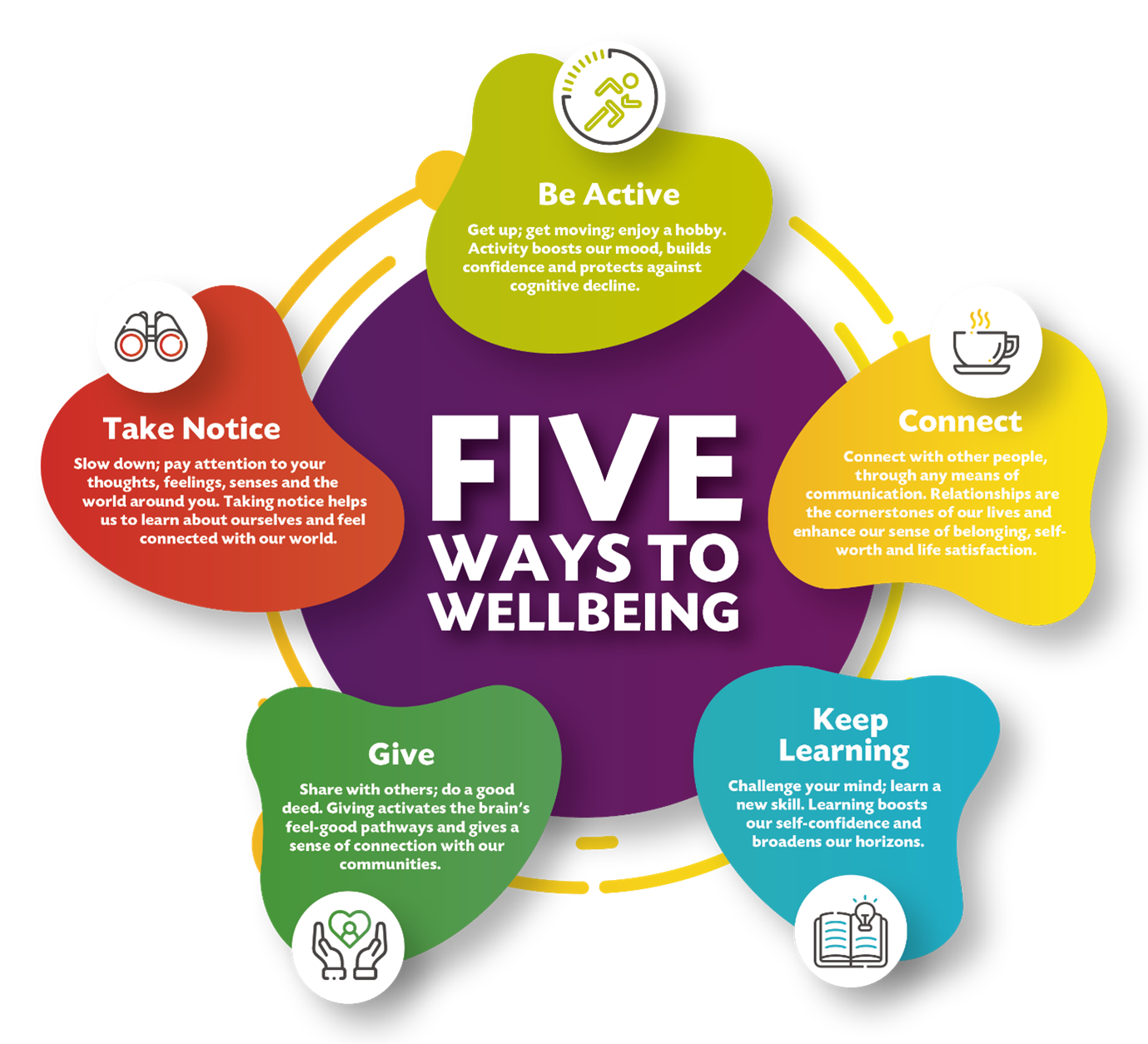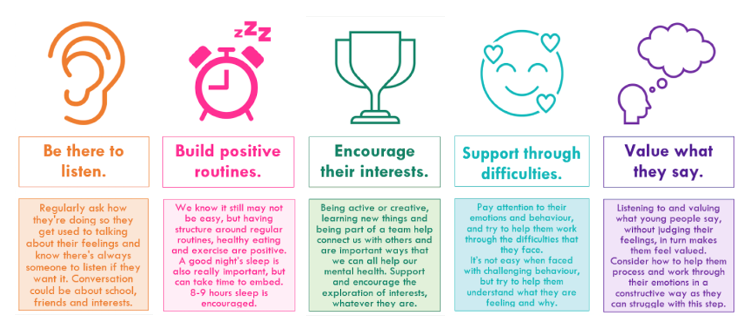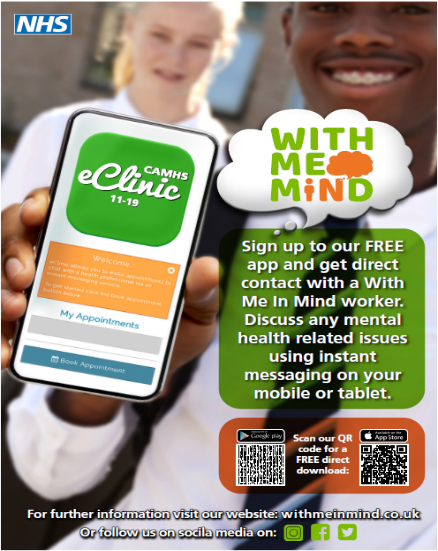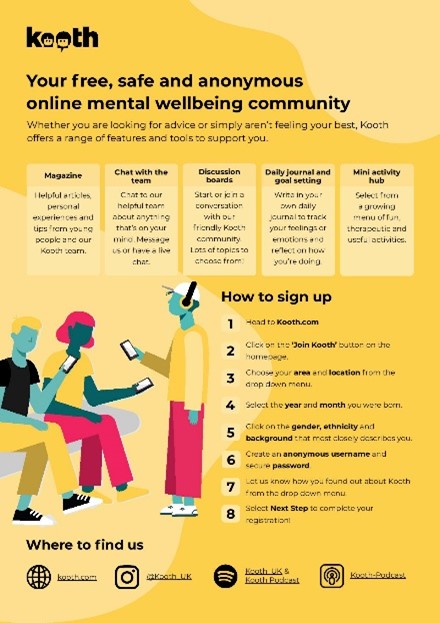What is Wellbeing?
The term “wellbeing” can be used to describe our complete health, including our physical, mental and emotional health. When we have good levels of wellbeing we feel that life is in balance and that we can generally cope well. We feel motivated and engaged and are able to show resilience and “bounce back” from life’s challenges.
Just like physical health, we all have mental/emotional health; there will be times when our mental health may not be as good as it could be; when this happens, some emotions we may feel are feeling down, sad, quiet, upset, angry, frustrated.
But like physical health, you can also do things to help look after your mental health. It is really important to keep regular routines wherever possible, such as, attending school and lessons as well as having some set times to do various activities throughout your week.
Our school offers a range of services to help students develop positive mental health and wellbeing and support those experiencing mental health issues. The pastoral team support positive mental health and wellbeing across school.
Looking After Yourself
The country was impacted emphatically by the Covid-19 pandemic and around a third of adults and young people reported a decline in their mental health as a result of this. As we now move on from the pandemic it is important to realise that just because we can now be vaccinated against the virus, that doesn’t mean that mental well-being is also cured. We now face many different challenges both at school and at home. Post-pandemic, it is important to make sure that we have the right support in place for our students and the wider community here at Dinnington High School.
Taking care of our mental health and checking in on others is something that we can all do. Remember when they tell you on aeroplanes that you need to put on your own oxygen mask before helping others, it’s like that. Try to plan your days or weeks to include something from each of the ‘5 ways to wellbeing’.

1. BE ACTIVE
Regular physical activity is associated with lower rates of depression and it doesn’t have to be intense to make a difference. Do as much or as little as you can – you could try walking, dancing, running, cycling or gardening.
2. CONNECT
People who are connected with family, friends or people living in their community are happier, physically healthier, live longer and generally have fewer problems mental health problems. To connect with others, you could join a group, help a friend, family member or colleague or try volunteering.
3. GIVE
It has been proven that people who offer an act of kindness once a week over a six-week period report an improvement in their wellbeing. Giving could be smiling at someone and saying thank you. It could be volunteering within the local community or doing something nice for a colleague or friend.
4. KEEP LEARNING
People should never stop learning. Learning throughout life enhances self-esteem, increases confidence, encourages social interaction and generally leads to people having a more active life. Why not learn a new skill like cooking, playing an instrument, fixing a bike, photography or painting.
5. TAKE NOTICE
Life can be very busy with little time to stop and reflect. Studies have shown that when people are aware of what is taking place in the present it directly enhances well-being. People worry less about the future and what has happened in the past and can see what really matters, allowing them to make positive choices. Stopping and observing; spending time with friends and family; enjoying nature; and taking a different route home from work or the shops noticing what is different are all ways to take notice.
Support in School
There are many places that you can get support in school if you are worried about something and don’t feel that you can cope with it or need some advice on how to approach things.
Form Tutors and your Year Leaders are available to discuss any issues. Many things can cause a change in mental health including traumatic events (e.g. loss or separation, life changes, abuse, domestic violence or bullying).
Regular Assemblies and Morning Guidance activities which cover aspects of mental health and wellbeing and support building resilience.
Learning for Life staff will cover mental health and wellbeing in your lessons
Miss Boocock and Mrs Wilson-Taylor, ELSA Practitioners offer support to students on wellbeing on a 1:1 or small group basis. Your Head of year can refer you.
Our School Nurse is in school on a regular basis to offer students support on wellbeing and mental health. Your HOY Team can refer you.
Wellbeing Surveys to ask you for your thoughts and ideas regarding wellbeing.
Student Leaders and #SafeToBeMe Leaders can also help you to get support from staff in school.
Any member of staff you feel comfortable talking to, will help you or you can contact Mr Williams.
If you would prefer to seek support out of school, please look at the Wellbeing Resources page that features helpful guides to navigating mental health issues, as well as links to external resources that may help you. Whether you utilise internal or external resources, the most important thing is you get the advice and help that you need.
Wellbeing and School Mental Health Contacts
| Vice Principal and DSL | Mrs R Parks | r.parks@din.leap-mat.org.uk |
| Senior Mental Health Lead | Mr R Williams | r.williams@din.leap-mat.org.uk |
| Head of Inclusion & Welfare | Miss S Daley | s.daley@din.leap-mat.org.uk |
| SENCO & Head of Engage | Miss S Humphries | s.humphries@din.leap-mat.org.uk |
| Head of Achieve | Miss J Perkins | j.perkins@din.leap-mat.org.uk |
| Year 7 Leaders | Mrs J Smith & Mr R Gardner | Din-HoY7@din.leap-mat.org.uk |
| Year 8 Leaders | Miss S McMillan & Mr S Hunter | Din-HoY8@din.leap-mat.org.uk |
| Year 9 Leaders | Mr S Rhodes & Mrs E Mennell | Din-HoY9@din.leap-mat.org.uk |
| Year 10 Leaders | Mrs K Shay & Mr R Williams | Din-HoY10@din.leap-mat.org.uk |
| Year 11 Leaders | Mrs C Paling & Mr S Ebbs | Din-HoY11@din.leap-mat.org.uk |
| Sixth Form Leader | Mrs J Fisher | j.fisher@din.leap-mat.org.uk |
| Sixth Form Leader | Mrs H Rhodes | h.rhodes@din.leap-mat.org.uk |
Wellbeing Advice for Parents and Carers
Being a parent or carer of a secondary school age child has its challenges. As we see our children develop into adults and support them through the physical and emotional changes. As parents and carers we play an important role in teaching children and young people how to understand and manage their feelings as they grow up. Children’s wellbeing is closely bound to their parents’ wellbeing. Therefore, it is vital you look after you and seek help and advice if you are struggling.
In the useful links and websites section there is a page providing several links and telephone numbers for support services for both you and your child. If you do have concerns about your child’s wellbeing or mental health, please seek medical advice or during school hours contact your child’s Form Tutor or Year Leaders on 01909 550066. Email addresses for Year Leaders can be found on the school mental health contacts link below. You may also be able to find some useful tips in our Wellbeing Resources page.





